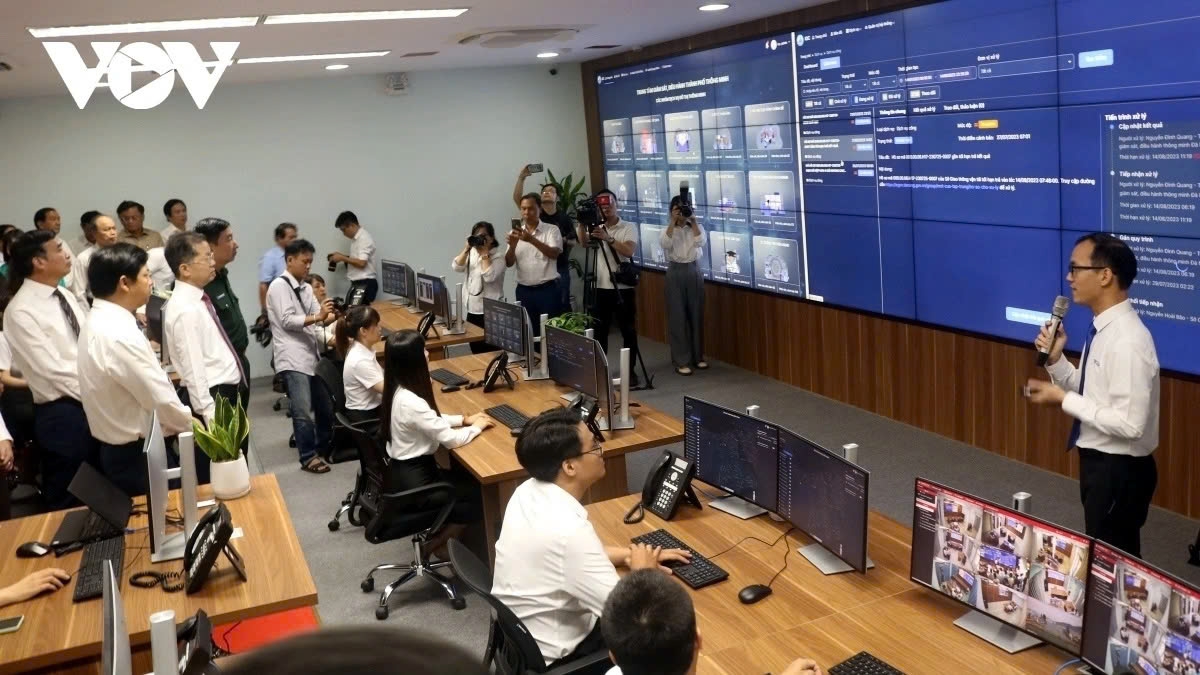Universities launch new academic programmes on semiconductor chip design
VOV.VN - Many universities in Vietnam have announced the launch of new academic programmes related to semiconductor chip design in 2025 to meet the increasing social demand and to realize the National Semiconductor Industry Development Strategy by 2030 with a Vision to 2050.
New academic programmes on semiconductor chip design

A representative from Ton Duc Thang University shares that the university will recruit students for the newly launched Semiconductor Design Engineering programme in 2025. The programme is based on the existing Electronics and Telecommunications Engineering curriculum, and it will be continuously updated with the latest advancements in semiconductor technology.
Hanoi National University of Education plans to enroll 4,995 students in 50 undergraduate programmes across nine disciplines in 2025, including Physics (Semiconductor Physics and Engineering). The Physics programme expects to admit 120 students through direct admission for high-achieving candidates, based on their performance in the university's competency assessment test, and through the 2025 National High School Graduation Exam results.
Similarly, Vietnam - Japan University under Vietnam National University, Hanoi, is also preparing to launch a Semiconductor Engineering programme, with an expected enrollment of 100 students for the 2025–2026 academic year.
Prof. Dr. Chu Duc Trinh, rector of University of Engineering and Technology (UET), under Vietnam National University, Hanoi, says that the university will open four new programmes in 2025, three of which are closely related to semiconductors, namely Electronics and Telecommunications Engineering with a focus on semiconductor design, Materials Technology (Materials Technology and Microelectronics), and Data Science (Science and Data Engineering).
The rector emphasizes that Vietnam holds great potential in its human resources and geopolitical position to develop the semiconductor industry. Recent visits from leaders of major semiconductor corporations and top global universities to Vietnam have reinforced the belief that the country is well-positioned to enter the semiconductor industry more deeply. Many international experts believe that this is a tremendous opportunity for Vietnam to leap forward.
“Although Vietnam joined the semiconductor industry relatively late, we are facing a once-in-a-thousand-year opportunity to become an important part of the global semiconductor value chain,” notes Prof. Dr. Chu Duc Trinh.
Global trends and market demand

The semiconductor industry is booming worldwide and serves as the foundation for modern technologies such as AI, IoT, 5G, and smart vehicles. The demand for skilled professionals in this field is high, not only in Vietnam but also globally. Vietnam is expected to need thousands of semiconductor engineers in the coming years for manufacturing and research.
Vietnam has identified semiconductor technology as a key priority in its push for digital transformation and Industry 4.0. The government is offering incentives to attract foreign investment in the semiconductor industry while encouraging universities to provide specialized training to build a highly skilled workforce.
Nguyen Anh Dung, deputy director of the Higher Education Department under the Ministry of Education and Training (MoET), says the MoET has established a Council for the Development of National Standards for Semiconductor Education Programmes. These standards will serve as the basis for universities to design and implement training programmes related to semiconductors, including pilot programmes, second-degree programmes, and joint programmes.
“For Vietnam, preparing human resources is crucial to successfully seizing the opportunities in the semiconductor industry. Universities, especially leading institutions in engineering and technology, will play a pivotal role in this effort,” emphasizes the official.
In reality, many large corporations, such as Intel and Samsung, as well as domestic companies, are heavily investing in semiconductor production and design in Vietnam, creating a significant demand for technical talent. Intel has expanded its facility in Ho Chi Minh City, while Samsung is building a new R&D center in Hanoi, motivating universities to develop related programmes.
In the context of global tech competition, Vietnam aims to reduce its dependency on foreign chip supplies by building its own capacity in semiconductor design and production. Training well-prepared human resources is a crucial step toward establishing a sustainable domestic semiconductor ecosystem.
In September 2024, Deputy Prime Minister Le Thanh Long signed a decision, approving the programme for developing human resources for the semiconductor industry until 2030, with a vision to 2050.
Its overall goal is to develop a high-quality workforce for the semiconductor industry by 2030, focusing on semiconductor design, packaging, and testing, gradually mastering production technologies. The programme aims to train at least 50,000 highly skilled professionals in all segments of the semiconductor value chain.
By 2050, Vietnam aims to build a strong workforce capable of joining the global semiconductor value chain, meeting the demands of the domestic semiconductor industry in both quantity and quality.
Universities don’t want to miss out on the race to recruit students for semiconductor-related programmes starting in 2025, aiming to meet social demand and align with the national semiconductor industry development strategy.




